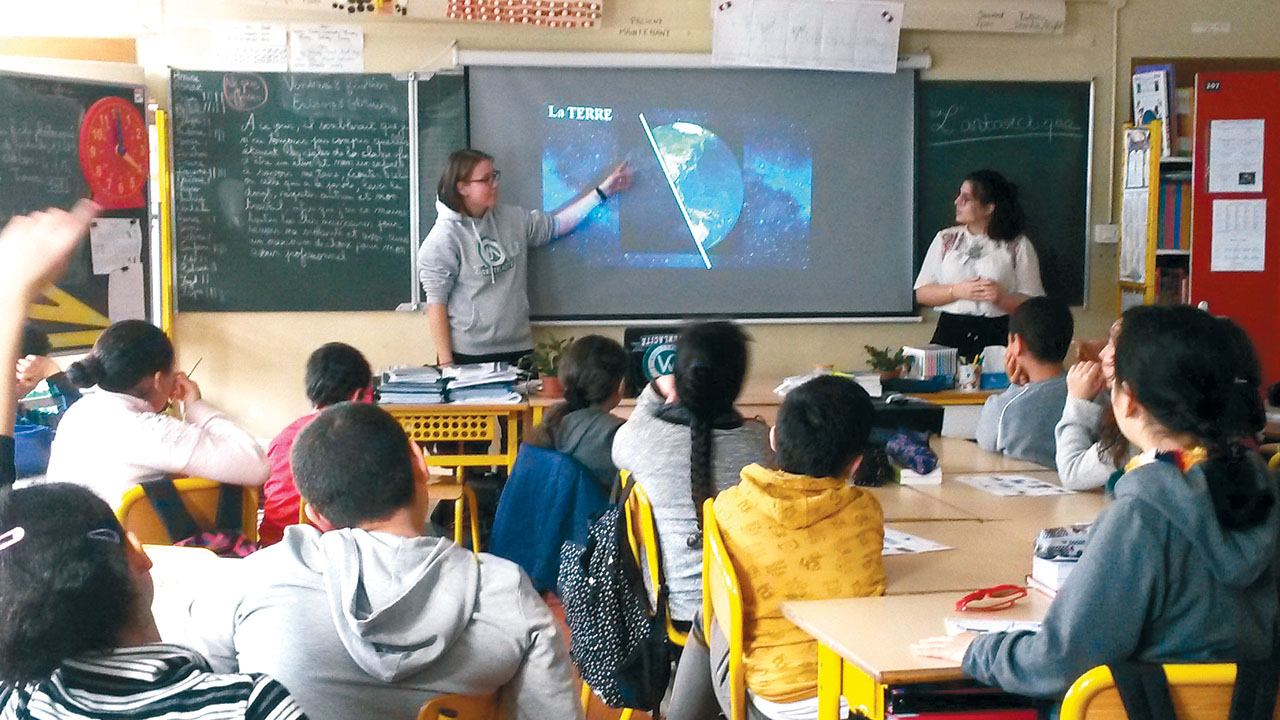UniverlaCité takes university to the neighborhoods
For the past 10 years, the UM has been visiting schools in disadvantaged neighborhoods. The aim? Introduce young people to scientific and academic disciplines and, why not, inspire a desire to study at university.
Friday, February 7, 2019, 2pm. On the 2nd floor of Simone Bolivar elementary school in the Mosson district, Olivier Abdank-Kossousky's CM2 class is abuzz with excitement. Is this excitement due to the imminence of the weekend? Far from it! As they have twice since the start of the school year, students from the Faculty of Science have come to pay the pupils a little visit...
Arctic and Antarctic
"What's the coldest place on Earth?", "What distinguishes a walrus from a sea lion or a seal?". Lara and Lucille's questions to the children as they enter the classroom are enough to restore the silence. For their 2nd UniverlaCité program at the Bolivar school, the two 3rd-year biology, environment and earth sciences degree students from the Faculty of Science chose to introduce the pupils to the boreal and austral polar regions, better known by their generic names: the Arctic and Antarctic. Over the course of almost an hour, a rhythmic, illustrated presentation on the discovery of the poles, and more particularly the South Pole, its climate and its endemic flora and fauna, unfolded perfectly under the watchful eye of the teacher. The little pupils, captivated by the two speakers' words, remained attentive and actively participated in the session, while at the back of the room, two students in microbiology and pharmacy - who in a few weeks' time will also be speaking to pupils - took notes on Lara and Lucille's well-honed techniques for "holding the class".
A fresh perspective
"We're in a difficult neighborhood where enthusiasm for school nevertheless exists. But almost all my pupils don't speak French at home. What's more, the vast majority of them come from modest backgrounds, some of them in very precarious situations. Every opportunity to stimulate their curiosity and enrich their general culture is therefore a good one to seize!" explains Olivier Abdank-Kossousky, delighted to give up his place from time to time to young people with a passion for science. "UniverlaCité gives students a concrete idea of what they can learn and become by studying at university. This openness to the sciences creates a previously unthinkable prospect for these vulnerable, disadvantaged children: to pursue higher education!" adds Catherine Dicky, headmistress of the elementary school that has been hosting the student volunteers involved in the scheme for almost 10 years.
Territories and priority education
A testament to the UM's societal dimension, UniverlaCité was created in 2009 with the aim of promoting the university in priority areas, and more specifically in schools in Montpellier's priority education network. The UM students involved withUniverlaCité work mainly in schools in the Mosson and Petit Bard districts. Each intervention is supervised by Thierry Noëll, initiator and coordinator of the program. " The students suggest that I develop a scientific topic, and together we define the essential framework to adapt it (format, vocabulary) to the target audience", explained this animal biology technician recently on the way to an elementary school where, on that very day, a young girl with a passion for ornithology was preparing to introduce a class of CM1s to methods for identifying city birds.
An ambassador for the UM beyond its walls and a committed university activist, Thierry Noëll is now considering the extension ofUniverlaCité in towns bordering Montpellier. To continue to offer every child, whatever their social background, the right to dream of being an astronaut, a zoologist or, why not, an explorer.
